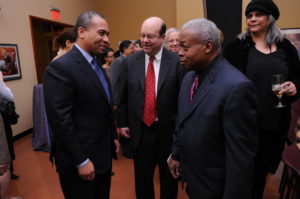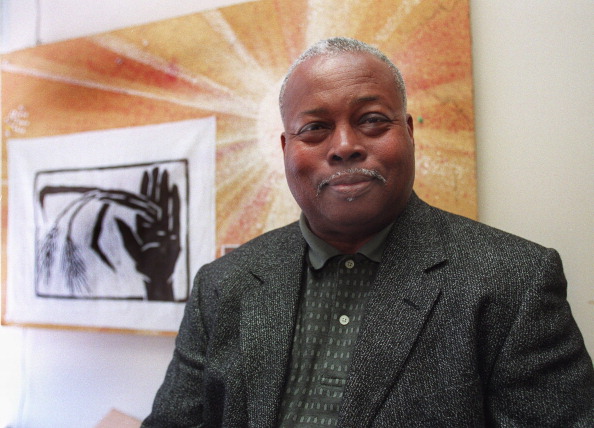“This week the CAMD community mourns the loss of Ed Bullins, a groundbreaking playwright and bracingly honest chronicler of the Black experience in the United States. For almost two decades, Ed was a beloved faculty member in the Department of Theatre, inspiring a new generation of artists to challenge, truth tell, and hold a mirror to the human experience. One of the most important Black playwrights of his time, Ed’s legacy will live on in the over 100 plays he produced over a half century of artistry.” – Dean Elizabeth Hudson, College of Arts, Media and Design
In the mid-1990s, renowned playwright Ed Bullins moved to Boston to begin the final chapter of his storied life.
A leading voice in the Black Arts Movement, a group of Black writers chronicling the Black experience in unsparingly honest terms for Black audiences in Black spaces, Bullins was awarded two Guggenheim grants and multiple Obie Awards during his prolific career.
“His work was always about trying to help people understand more about culture, particularly around the Black community. He was very adamant about raising levels of consciousness around issues of race,” said Richard O’Bryant, Director of the John. D. O’Bryant African American Institute at Northeastern. “Moreover, he was really one of those people that was concerned about humanity and just people in general … He was always educating through his work.”
The Educator
After going back to school later in life to earn his bachelor’s degree and MFA in playwrighting, Bullins moved across the country to help educate and nurture the next generation of fearless artists.
From 1995 to 2012, Bullins taught courses in playwrighting, performance, and African American theatre. As an educator, Bullins taught with the same truthfulness and integrity he displayed in his work. Students recalled that “he always mentored them to be ‘true to yourself’ and encouraged them to ‘find their own voice,’” said Janet Bobcean, Professor Emerita in the Department of Theatre.
“Ishmael Reed said that Ed Bullins was a Black playwright “who spoke to the values of the urban experience” and to the many Black and Brown folks who may never even have seen a play,” said Greg Allen, Visiting Assistant Teaching Professor. “To me, as a young man of color and as a theatre student and a young director, Bullins was exactly that and so much more. He was situated in academia, yet he never compromised his advocacy for Black rights, for theater of the people, for speaking truth to power.”
“When I came to teach theatre at Northeastern University,” Allen added, “I was very aware of Bullins’ legacy here and I was both proud and challenged by the idea of working at the same university to which Ed Bullins had given so much of his artistic talent and energy.”

At Northeastern, Bullins worked closely with the John D. O’Bryant African American Institute and with fellow Black faculty and staff to elevate Black culture, including a memorable musical performance he organized at the Institute featuring the work of Pat Patrick. Patrick’s son, then-Governor Deval Patrick, as well as Northeastern President Joseph Aoun were both in attendance.
The Elder Statesman
For Bullins, teaching and creation did not stop at the college doors. He became a kind of “elder statesman” of the local theatre community, said Boston-area playwright and producer Amy Merrill, getting involved “as a mentor, a fellow playwright, and a fellow producer.”
Candelaria Silva-Collins, a Boston-based consultant and writer, recalls asking Bullins to lead a Developmental Playwrighting Course for emerging playwrights through ACT Roxbury. He agreed “without hesitation,” and “taught them not only the structure of plays, [but] gave them one-on-one instruction and helped them mount a public reading,” she said. “Ed was approachable and challenging, delivering instruction and wisdom clearly with a droll sense of humor.”
Hibernian Hall Playwright-in-Residence and former student Mary McCullough recalled: “After reading twenty pages of a play I had been working on, he said “What’s the point?” I threw those pages in the trash bin. He was tough on us new playwrights. I still hear his voice as I write today … He gave us African American playwrights strong shoulders to stand on.”
Said former students Louis Johnson, now a playwright whose work has been produced across the country, “He taught me everything I know. And without Ed, nothing would’ve ever happened for me. And I will carry that thought with me forever.”
The Man
Upon reading the national obituaries following Bullins’ death this month, many in the local theatre scene expressed awe at just how big a legacy Bullins leaves behind. Despite his many accomplishments, he never bragged. Bullins was remembered as “humble,” “a man of few words” with “a gentle smile.”
Therefore, it is up to one of the many lives Bullins touched to share just how significant an impact he made on his students, American theatre, and the Boston community.
“Bullins was a lighthouse beacon on a sea of whiteness and suburban dreams for young people of color striving to make lives in the American theatre,” said Allen. “He showed us another way to be. He is most definitely one of the foremost Black playwrights, directors, and teachers on whose shoulders my generation proudly stand.”


